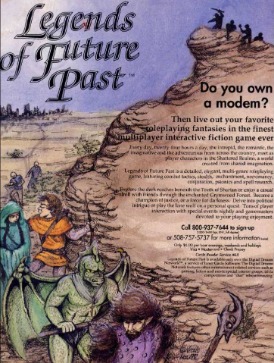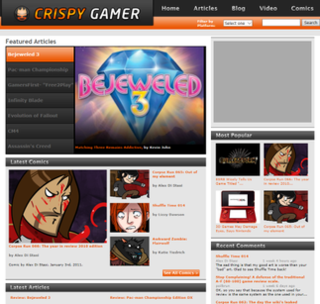A massively multiplayer online role-playing game (MMORPG) is a video game that combines aspects of a role-playing video game and a massively multiplayer online game.
The Xbox network, formerly and still sometimes branded as Xbox Live, is an online multiplayer gaming and digital media delivery service created and operated by Microsoft. It was first made available to the Xbox system on November 15, 2002. An updated version of the service became available for the Xbox 360 console at the system's launch in November 2005, and a further enhanced version was released in 2013 with the Xbox One. This same version is also used with Xbox Series X and Series S. This service, in addition to a Microsoft account, is the account for Xbox consoles; accounts can store games and other content.

An online game is a video game that is either partially or primarily played through the Internet or any other computer network available. Online games are ubiquitous on modern gaming platforms, including PCs, consoles and mobile devices, and span many genres, including first-person shooters, strategy games, and massively multiplayer online role-playing games (MMORPG). In 2019, revenue in the online games segment reached $16.9 billion, with $4.2 billion generated by China and $3.5 billion in the United States. Since 2010s, a common trend among online games has been operating them as games as a service, using monetization schemes such as loot boxes and battle passes as purchasable items atop freely-offered games. Unlike purchased retail games, online games have the problem of not being permanently playable, as they require special servers in order to function.

Junction Point Studios (JPS) was an American video game developer based in Austin, Texas founded by Deus Ex creator, Warren Spector, in 2004. Disney Interactive Studios acquired Junction Point Studios in July 2007 to develop a property based on Oswald the Lucky Rabbit, a character created by Walt Disney but owned by Universal Studios until the character was acquired by The Walt Disney Company from Universal in 2006. The studio was closed in 2013.

Lost Planet: Extreme Condition is a third-person shooter video game developed and published by Capcom for Xbox 360, Microsoft Windows and PlayStation 3. The game was released in Japan in December 2006 and worldwide in January 2007. Originally intended to be an Xbox 360 exclusive, it was later ported and released for Microsoft Windows in June 2007 and PlayStation 3 in February 2008.

Legends of Future Past was the first commercial text-based MUD to make the transition from a proprietary network provider to the Internet. It was designed by Jon Radoff and Angela Bull. It was also notable in that it had paid Game Masters who conducted online events. The game was originally offered for $6.00 per hour in 1992 via CompuServe, and then lesser amounts via the Internet, operating until December 31, 1999.
In-game advertising (IGA) is advertising in electronic games. IGA differs from advergames, which refers to games specifically made to advertise a product. The IGA industry is large and growing.

Boonty is a global supplier of digital distribution services for online and PC gaming whose technology platform and brand names were acquired by digital commerce provider Nexway in January 2009.

Jon Radoff is an American entrepreneur, author and game designer. His work has focused on online communities, Internet media and computer games. He is CEO and co-founder of Beamable, a Live Game services platform that enables the creation of online games based on Unity.

Entertainment Consumers Association (ECA) is a United States-based non-partisan, non-government, non-profit organization dedicated to the interests of individuals who play computer and video games in the United States and Canada.

The Bartle taxonomy of player types is a classification of video game players (gamers) based on a 1996 paper by Richard Bartle according to their preferred actions within the game. The classification originally described players of multiplayer online games, though now it also refers to players of single-player video games.
A guild hosting or clan hosting service is a specialized type of web hosting service designed to support online gaming communities, generally referred to as guilds or clans. They vary from game server hosting in that the focus of such companies is to provide applications and communication tools outside the gaming environments themselves.

hi5 is an American social networking service based in San Francisco, California. It is owned by The Meet Group.
ZeniMax Online Studios LLC is an American video game developer and a subsidiary of ZeniMax Media, specializing in massively multiplayer online games. The company developed The Elder Scrolls Online and its downloadable content. ZeniMax Online Studios had around 250 employees in 2012. In addition to the main Hunt Valley, Maryland based office, ZeniMax Online also maintains a customer support center in Galway, Ireland as well as an additional office in Austin, Texas.

Bigpoint GmbH is a German video game developer. The company develops stand-alone browser-based games as well as social network games. Bigpoint has over 200 million registered users. Bigpoint.com states that 337,104,419 players are registered in the top right corner, as of 10/10/13. NBCU has featured some of Bigpoint's games on the websites of some of its cable channels.

Crispy Gamer was an American video game website that published news, culture, reviews, comics, and videos. It launched on October 26, 2008, as an independent website after being in beta for six months. Founding staff included former employees of Google, eMusic, and gaming website GameSpy. In January 2010, one month after acquiring gamerDNA, the editorial staff was laid off by the authority of the board of directors, with the company's CEO resigning in protest. The website continued to operate, with gamerDNA being acquired by Live Gamer in 2011. It was stated in 2012 that the website became defunct.
RockYou was a company that developed widgets for MySpace and implemented applications for various social networks and Facebook. Since 2014, it has engaged primarily in the purchases of rights to classic video games; it incorporates in-game ads and re-distributes the games.
Playdom was an online social network game developer popular on Facebook, Google+ and Myspace. The company was founded in the San Francisco Bay Area by University of California, Berkeley graduates Ling Xiao and Chris Wang and Swarthmore College graduate Dan Yue. In 2009, the market for games played on social networking sites was valued at $300 million, consisting mostly of online sales of virtual goods.
Unlockable content refers to content that is available in video games but not accessible unless something is performed by the player to get access to it. Different genres of games have different styles and options of unlockable content that is standard among their games. The unlockable content varies, and can be as little as a single weapon or enhancement, to more than doubling the playable characters available to the player.
Playfire was a social gaming networking website targeted towards core video game players. Playfire allowed users the ability to automatically track their in-game achievements, trophies, and gameplay, as well as earn rewards for playing their games.











